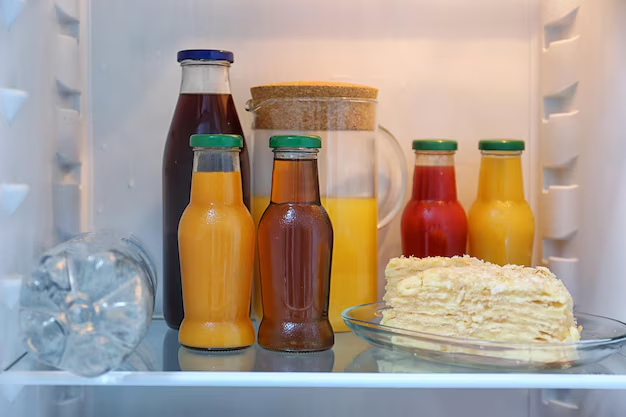How Fresh is Your Juice? Tips for Refrigerating Fresh Juice Safely 🍹
Imagine starting your day with a glass of refreshing, nutrient-rich fresh juice. It's a simple pleasure that many enjoy. However, preserving that freshness can be a challenge. How long can you keep fresh juice in the refrigerator before it loses its flavor or, worse, becomes unsafe to drink? In this guide, we’ll dive deep into storing fresh juice, ensuring it stays as enriching and delightful as the moment it was made.
Why Proper Refrigeration Matters
Fresh Juice and Its Perishability
Fresh juice, made from fruits and vegetables, doesn’t contain preservatives. This makes it more susceptible to spoilage compared to commercially produced juices. The natural sugars and acids create an environment where bacteria and yeast can thrive if not stored properly.
Refrigeration: The Key to Longevity
The cold environment of a refrigerator slows down the growth of harmful microorganisms. By refrigerating your juice promptly, you maintain its nutritional benefits and ensure it remains safe to consume. But just how long can you expect that freshness to last?
Understanding Fresh Juice Shelf Life
General Guidelines 🕒
For optimal quality and safety, it's widely recommended that fresh juice should be consumed within 24 to 72 hours. This timeframe ensures that most of the nutritional content and flavor are preserved.
- 24 Hours: Maximum freshness and nutritional value.
- 48 Hours: Still generally good but may begin to lose some nutrients.
- 72 Hours: Safe if stored correctly, but flavor and nutritional quality might diminish.
Factors Affecting Shelf Life
Several elements can impact how long fresh juice remains consumable in the fridge:
- Ingredients Used: Certain fruits, like apples and citrus fruits, naturally have preservatives in the form of acids that can help extend shelf life slightly.
- Juicing Method: Cold-pressed juices, as opposed to those made with centrifugal juicers, often maintain freshness longer due to reduced exposure to heat from friction.
- Storage Conditions: An airtight container minimizes exposure to air, slowing oxidation and spoilage.
Best Practices for Storing Fresh Juice
Choose the Right Container 🍶
Airtight and Opaque
Using airtight containers is crucial. It reduces oxygen exposure, which can degrade the juice's quality. Opt for opaque containers to protect against light, which can also diminish nutrients.
Keep It Cold ❄️
Optimal Temperature Range
Ensure your refrigerator is set to at least 40°F (4°C) or lower. Keeping the juice in the coldest part of the fridge, usually toward the back, helps maintain a stable temperature.
Consume Promptly ⏳
While it might be tempting to make large batches of juice, consider consuming it as soon as possible for peak freshness. If you intend to drink it over several days, a better approach may be to juice every couple of days.
Creative Storage Solutions
Freeze for Extended Preservation
If you find yourself with more juice than you can consume within three days, freezing is a viable option. Pour the juice into a freezer-safe container, leaving some space for expansion. Frozen juice can generally be kept for 2 to 3 months without a significant loss of flavor or nutrients.
Try Flavor Enhancements
Adding ingredients like lemon or lime juice can help preserve other juices by increasing the acidity, which naturally deters bacterial growth. Not only does this extend shelf life, but it also enhances flavor.
Recognizing Spoilage Signs 🚨
From time to time, understanding when juice has gone bad can prevent potential health risks. Here are some signs to watch for:
- Off Odor: A sour or fermentation-like smell is a clear indication of spoilage.
- Discoloration: Natural juices might darken slightly due to oxidation, but a significant color change indicates deterioration.
- Unpleasant Taste: Metallic or off flavors suggest bacterial growth.
- Fizziness or Bubbling: A sign of unwanted fermentation.
Bullet Point Summary: Keeping Juice Fresh 📝
- Refrigerate within 2 hours of juicing.
- Consume within 72 hours for best quality.
- Use airtight, opaque containers.
- Store below 40°F (4°C).
- Freeze if necessary for long-term storage.
Nutritional Considerations
Retaining Nutrients
The nutritional value of fresh juice can degrade over time. Vitamin C, a common nutrient in citrus juices, is particularly sensitive to light and air. To maximize retention:
- Minimize air exposure with airtight containers.
- Reduce light exposure with opaque bottles.
Incorporating Pulp ♻️
For those concerned with fiber intake, consider repurposing the residual pulp in smoothies or baked goods. This not only minimizes waste but also boosts dietary fiber intake.
Exploring Related Topics
Juicing Techniques and Tools
Understanding the differences in juicing equipment can aid in choosing the best method for maximizing shelf life and nutrition.
- Cold-Pressed Juicers: Generally yield juice with a longer shelf life and higher nutritional content.
- Centrifugal Juicers: Faster but can introduce more air, potentially reducing juice longevity.
The Role of Fresh Juice in Diet
Incorporating fresh juice into your daily routine offers an easy, delicious way to boost nutrient intake. However, balance is crucial, given that juices can be calorie-dense and low in fiber.
Final Insights for Juicing Enthusiasts 🌟
Storing fresh juice correctly is paramount in preserving its taste, health benefits, and safety. By paying attention to the type of fruits used, the juicing method, and the storage practices, you can enjoy high-quality, nutritious juice every time. Embrace the freshness, and let each sip fill your day with natural vitality and refreshment.
Remember, while refrigeration is your best friend for short-term storage, freezing juice allows for greater flexibility without significant compromise on quality. So go ahead, juice with joy, knowing you’re equipped to maximize the benefits of your homemade beverages!

